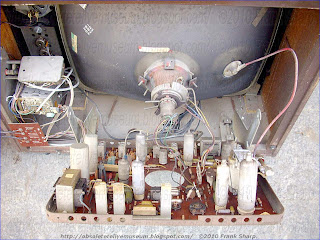
Philips is one of the largest electronics companies in the world. In 2009, its sales were €23.18 billion. The company employs 115,924 people in more than 60 countries.[1]
Philips is organized in a number of sectors: Philips Consumer Lifestyles (formerly Philips Consumer Electronics and Philips Domestic Appliances and Personal Care), Philips Lighting and Philips Healthcare (formerly Philips Medical Systems).
he company was founded in 1891 by Gerard Philips, a maternal cousin of Karl Marx, in Eindhoven, Netherlands. Its first products were light bulbs and other electro-technical equipment. Its first factory survives as a museum devoted to light sculpture.[2] In the 1920s, the company started to manufacture other products, such as vacuum tubes (also known worldwide as 'valves'), In 1927 they acquired the British electronic valve manufacturers Mullard and in 1932 the German tube manufacturer Valvo, both of which became subsidiaries. In 1939 they introduced their electric razor, the Philishave (marketed in the USA using the Norelco brand name).

Philips was also instrumental in the revival of the Stirling engine.
As a chip maker, Philips Semiconductors was among the Worldwide Top 20 Semiconductor Sales Leaders.
In December 2005 Philips announced its intention to make the Semiconductor Division into a separate legal entity. This process of "disentanglement" was completed on 1 October 2006.
On 2 August 2006, Philips completed an agreement to sell a controlling 80.1% stake in Philips Semiconductors to a consortium of private equity investors consisting of Kohlberg Kravis Roberts & Co. (KKR), Silver Lake Partners and AlpInvest Partners. The sale completed a process, which began December 2005, with its decision to create a separate legal entity for Semiconductors and to pursue all strategic options. Six weeks before, ahead of its online dialogue, through a letter to 8,000 of Philips managers, it was announced that they were speeding up the transformation of Semiconductors into a stand-alone entity with majority ownership by a third party. It was stated then that "this is much more than just a transaction: it is probably the most significant milestone on a long journey of change for Philips and the beginning of a new chapter for everyone – especially those involved with Semiconductors".
In its more than 115 year history, this counts as a big step that is definitely changing the profile of the company. Philips was one of few companies that successfully made the transition from the electrical world of the 19th century into the electronic age, starting its semiconductor activity in 1953 and building it into a global top 10 player in its industry. As such, Semiconductors was at the heart of many innovations in Philips over the past 50 years.
Agreeing to start a process that would ultimately lead to the decision to sell the Semiconductor Division therefore was one of the toughest decisions that the Board of Management ever had to make.
On 21 August 2006, Bain Capital and Apax Partners announced that they had signed definitive commitments to join the expanded consortium headed by KKR that is to acquire the controlling stake in the Semiconductors Division.
On 1 September 2006, it was announced in Berlin that the name of the new semiconductor company founded by Philips is NXP Semiconductors.
Coinciding with the sale of the Semiconductor Division, Philips also announced that they would drop the word 'Electronics' from the company name, thus becoming simply Koninklijke Philips N.V. (Royal Philips N.V.).














No comments:
Post a Comment
The most important thing to remember about the Comment Rules is this:
The determination of whether any comment is in compliance is at the sole discretion of this blog’s owner.
Comments on this blog may be blocked or deleted at any time.
Fair people are getting fair reply. Spam and useless crap and filthy comments / scrapers / observations goes all directly to My Private HELL without even appearing in public !!!
The fact that a comment is permitted in no way constitutes an endorsement of any view expressed, fact alleged, or link provided in that comment by the administrator of this site.
This means that there may be a delay between the submission and the eventual appearance of your comment.
Requiring blog comments to obey well-defined rules does not infringe on the free speech of commenters.
Resisting the tide of post-modernity may be difficult, but I will attempt it anyway.
Your choice.........Live or DIE.
That indeed is where your liberty lies.
Note: Only a member of this blog may post a comment.